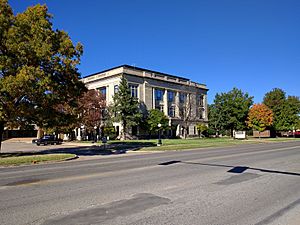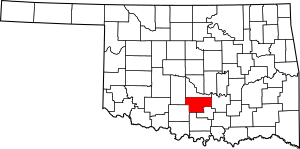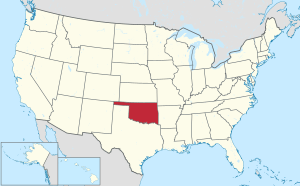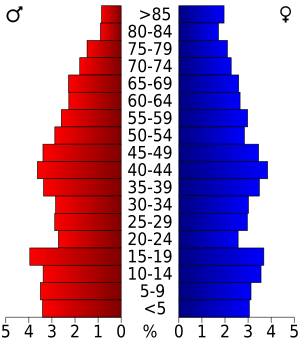Garvin County, Oklahoma facts for kids
Quick facts for kids
Garvin County
|
|
|---|---|

|
|

Location within the U.S. state of Oklahoma
|
|
 Oklahoma's location within the U.S. |
|
| Country | |
| State | |
| Founded | 1906 |
| Named for | Samuel J. Garvin |
| Seat | Pauls Valley |
| Largest city | Pauls Valley |
| Area | |
| • Total | 814 sq mi (2,110 km2) |
| • Land | 802 sq mi (2,080 km2) |
| • Water | 12 sq mi (30 km2) 1.4%% |
| Population
(2020)
|
|
| • Total | 25,656 |
| • Density | 31.518/sq mi (12.169/km2) |
| Time zone | UTC−6 (Central) |
| • Summer (DST) | UTC−5 (CDT) |
| Congressional district | 4th |
Garvin County is a place in south-central Oklahoma, United States. In 2020, about 25,656 people lived there. The main town and county seat is Pauls Valley.
The county was created in 1906. It was formed from a part of the Chickasaw Nation in what was then called Indian Territory. Garvin County got its name from Samuel J. Garvin. He was a local Chickasaw rancher, merchant, and banker. The county's main jobs are in farming, raising animals, and producing oil.
Contents
History of Garvin County
Garvin County officially began on November 16, 1907. This was the day Oklahoma became a state. Before this, the land was part of Pickens County, Chickasaw Nation in the Indian Territory.
Choosing the County Seat
On June 20, 1908, people in the county voted for their county seat. They chose Pauls Valley over other towns like Wynnewood and Elmore City. This made Pauls Valley the main administrative town.
Oil Discovery
Oil was found in the southwestern part of the county in the 1920s. This area became known as Robberson Field. Later, another big oil area called the Golden Trend pool developed. It stretched from the northwest to the southern parts of the county.
Geography of Garvin County
Garvin County covers a total area of about 814 square miles. Most of this, about 802 square miles, is land. The remaining 12 square miles (1.4%) is water.
The county is located between two different land areas. These are the Red Bed plains and the Sandstone Hills. The most important rivers and creeks here are the Washita River, Rush Creek, and Wildhorse Creek.
Main Roads in Garvin County
Many important roads pass through Garvin County. These roads help people travel and transport goods.
 Interstate 35
Interstate 35 U.S. Highway 77
U.S. Highway 77 U.S. Highway 177
U.S. Highway 177 State Highway 7
State Highway 7 State Highway 19
State Highway 19 State Highway 29
State Highway 29 State Highway 145
State Highway 145
Neighboring Counties
Garvin County shares its borders with several other counties.
- McClain County (north)
- Pontotoc County (east)
- Murray County (southeast)
- Carter County (south)
- Stephens County (southwest)
- Grady County (northwest)
People of Garvin County
| Historical population | |||
|---|---|---|---|
| Census | Pop. | %± | |
| 1910 | 26,545 | — | |
| 1920 | 32,445 | 22.2% | |
| 1930 | 31,401 | −3.2% | |
| 1940 | 31,150 | −0.8% | |
| 1950 | 29,500 | −5.3% | |
| 1960 | 28,290 | −4.1% | |
| 1970 | 24,874 | −12.1% | |
| 1980 | 27,856 | 12.0% | |
| 1990 | 26,605 | −4.5% | |
| 2000 | 27,210 | 2.3% | |
| 2010 | 27,576 | 1.3% | |
| 2020 | 25,656 | −7.0% | |
| U.S. Decennial Census 1790-1960 1900-1990 1990-2000 2010 |
|||
In 2000, there were 27,210 people living in Garvin County. This meant about 34 people lived in each square mile. There were 10,865 households, which are groups of people living together.
About 30.7% of households had children under 18 years old. Many families, about 56.4%, were married couples living together. In 2020, the population went down to 25,656 people.
The people in the county were spread out by age. About 24.8% were under 18 years old. About 17.9% were 65 years or older. The average age was 39 years old.
Economy of Garvin County
Oil and gas production are important to Garvin County's economy. However, farming has been the main source of jobs since Oklahoma became a state. In 1907, crops like alfalfa, cotton, and onions were worth a lot of money.
By the 1930s, over 1,000 acres were planted with pecan trees. These trees grew pecans with thin shells. By 1961, the Lindsay area harvested more broomcorn than anywhere else in the world. This led to the county's slogan: "We sweep the world."
Towns and Cities in Garvin County
Garvin County has several communities. These include cities, towns, and smaller communities.
Cities in Garvin County
- Davis (mostly in Murray County)
- Lindsay
- Pauls Valley (county seat)
- Wynnewood
Towns in Garvin County
Smaller Communities
These are communities that are not officially cities or towns.
Old and Historic Places
- Antioch (a ghost town, meaning it's no longer inhabited)
- Fort Arbuckle (a historic place)
See also
 In Spanish: Condado de Garvin para niños
In Spanish: Condado de Garvin para niños


